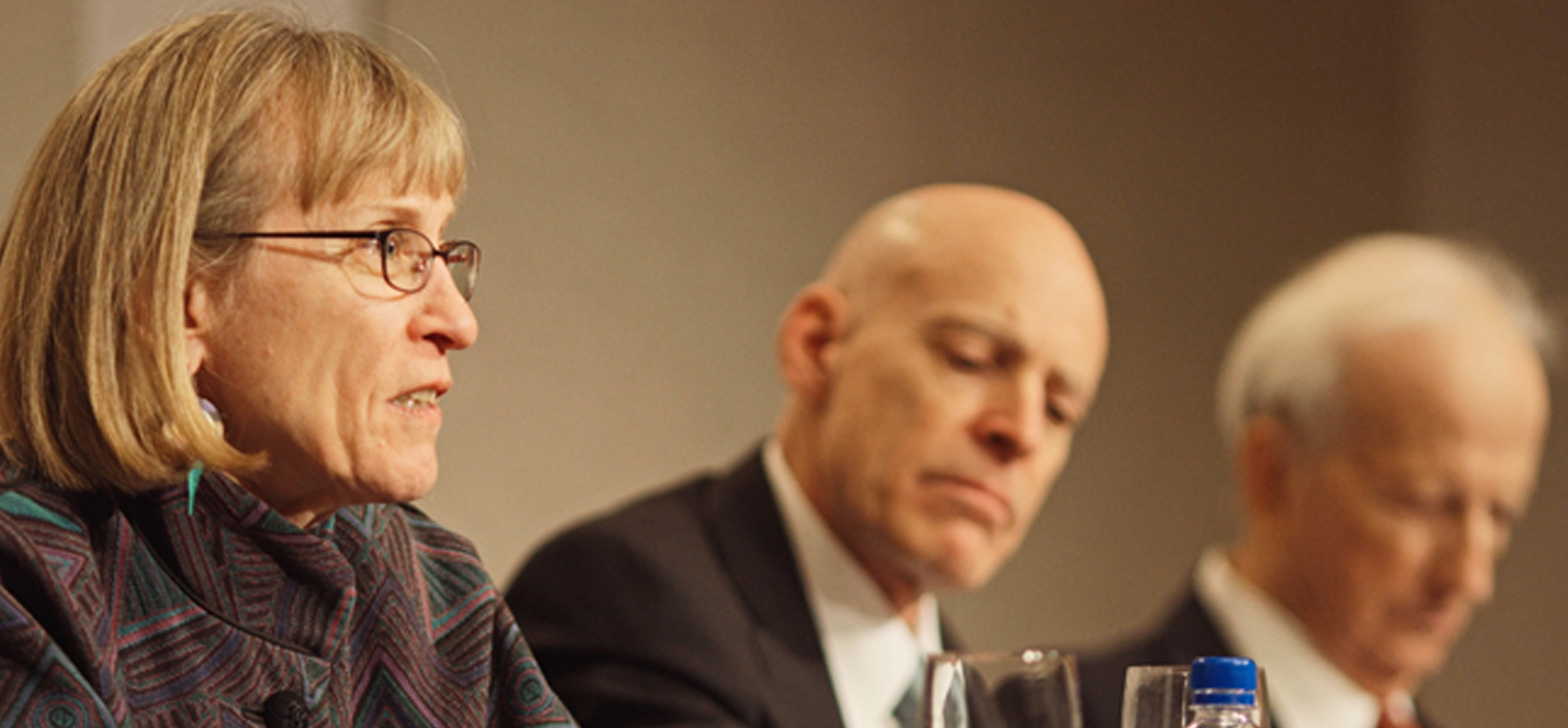
Goldin says the United States needs to strengthen academic standards to increase its competitive workforce. (Photo by Jamie Watts/Becker Friedman Institute)
Panelists at a Becker Friedman Institute event tackle policy issues in classic Chicago style.
At a January event in New York, University president Robert J. Zimmer introduced the Becker Friedman Institute for Research in Economics as an endeavor that will build on the tradition of the Chicago school of economics. UChicago economists, Zimmer reminded the more than 220 alumni and business leaders in the audience, produced insights that changed how governments viewed their economic structures. “Many of you will remember the rather famous remark that George Will made after the fall of the Soviet Union” and the spread of free-market systems around the world, Zimmer said: “‘The Cold War is over, and the University of Chicago has won.’”
The new institute, which combines the Milton Friedman Institute with the Becker Center on Price Theory, Zimmer said, is designed to continue the generating and nurturing ideas that change the world. Some of those ideas were on display during two panel discussions on some of today’s most pressing economic policy challenges.
Institute chair Gary S. Becker, AM’53, PhD’55, led a discussion of human capital and its importance in an information-based economy. Becker and Claudia Goldin, AM’69, PhD’72, the Henry Lee professor of economics at Harvard University, showed how the US educational system powered economic growth for much of the 20th century, but stagnation in high-school graduation rates translates into a workforce lacking the skills to compete. Presenting information from her book with Lawrence F. Katz, The Race Between Education and Technology (Harvard University Press, 2008), Goldin called for more competition and stronger academic standards.
Kevin Murphy, PhD’86, the George J. Stigler professor of economics at Chicago Booth, agreed: Of the three factors driving GDP growth—investment in physical capital, investment in human capital, and new technology—“people are the most important input,” he said. “Human capital accounts for roughly 65 percent of our productive capacity. If you don’t increase the skills of your workforce, it’s harder and harder to absorb technical innovations and advances.”
The dearth of skilled workers, Murphy said, fuels the wage premium for college-educated workers and growing income inequality. Because improving the educational system and producing more skilled workers could take 20 years or more, Becker advocated a quicker fix: a market-based immigration system to bring in workers with the necessary expertise.
Leading a panel on financial markets and the macroeconomy, institute research director Lars Peter Hansen noted that Milton Friedman, AM’33, “pushed us to think about the important interactions between monetary and fiscal policy.” Commenting on fiscal decentralization in Europe, Agustin Carstens, AM’83, PhD’85, governor of the Bank of Mexico, drew parallels to a series of fiscal crises in Latin America in the 1970s and ’80s rooted in flawed exchange-rate policies.
“So what has Europe done? Europe has fixed exchange rates, not just one to another but 17 countries together,” said Carstens. “To make that exchange-rate arrangement sustainable, you have to make the fiscal policies consistent to fit that exchange-rate policy. It’s not that difficult to see that you’d have a problem at some point in time.”
Myron Scholes, MBA’64, PhD’70, a 1997 economics Nobelist, noted that it was difficult to tell whether European nations have liquidity or solvency problems, which imply different solutions. “The problem with the 17 countries is that there is no consistency or a fiscal union to create a unified response.”
Asked about the new US Treasury Department Financial Stability Oversight Council’s capacity to identify and manage risks, Scholes said, “When you have this idea of a systemic risk regulator, what you’ve done is cement in the notion of too big to fail. You’ve guaranteed a bailout, so [financial institutions] are going to take even more risks.”
The panelists differed on how to deal with financial institutions deemed too big to fail, but when asked if the financial crisis could be laid at the market’s door, there was more agreement: no. “I wouldn’t throw the market economy out the window. I would focus on how we can improve incentives and reduce information asymmetries,” Carstens said. “The world has moved forward. We have to tackle these issues from a legal and accounting point of view, but that doesn’t mean markets have failed.”
